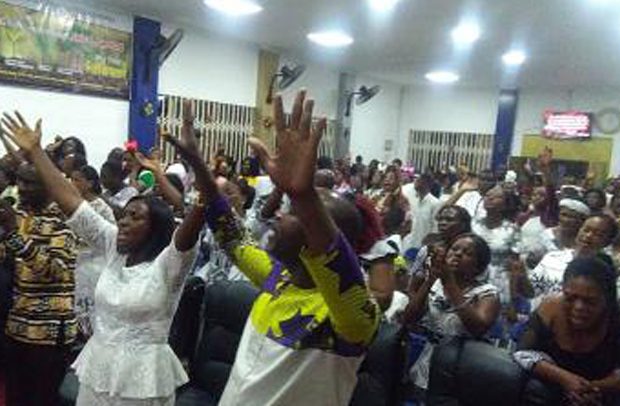President Akufo-Addo’s Sunday evening announcement about the conditional reopening of places of worship has been met with excitement from both Christian and Muslim fraternities, although some are still urging caution in order not to further spread Covid-19.
The President had said with effect from Friday, 5th June, the government was allowing Stage One of the process of easing restrictions.
“An abridged format for religious services can commence. Twenty-five per cent (25%) attendance, with a maximum number of one hundred (100) congregants can worship at a time in church or at the mosque, with a mandatory one-metre rule of social distancing between congregants,” he said.
“In addition to the mandatory wearing of masks for all persons at all times in churches and mosques, a register of names and contact details of all worshippers and hand washing facilities and sanitisers must be provided, with a maximum duration of one (1) hour for each service,” he added.
Passionate Appeal
In easing the restrictions, the President had appealed passionately to the religious groups, saying “in the case of Christians, on the first Sunday of reopening, i.e. 7th June, in the case of the Adventists, Saturday, 6th June, and in the case of Muslims, on the first Friday, i.e. ?al?t al-Jumu?ah on 5th June, to dedicate their worship to prayers for the nation in these challenging times,” and added that the Minister for Religious Affairs was to “outline, in detail, the specific guidelines for the safe reopening of our churches and mosques.”
Schools Reopening
Additionally, the President said, “From Monday, 15th June, 2020, the decision has been taken, after engagement with the Teacher Unions, whose cooperation I salute, to reopen schools and universities to allow for final year junior high, senior high and university students to resume classes ahead of the conduct of their respective exit examinations.”
Varied Interpretation
Many Christian groups and associations have welcomed the President’s move even before the Religious Affairs Minister swings into action with his outline.
Bishop Titi Offei, General Secretary of the National Association of Charismatic and Christian Churches (NACCC), said they are delighted to be able to hold church services again.
“Any easing of restrictions with regard to Covid-19 is welcoming to all Ghanaians, especially when it gives them hope that things are better. So generally, it is welcoming and especially for us as a church and as an association, it is also very welcoming,” he added.
25% Quota
He said, “The difficulty is the 25% and the 100 people directive. Interpretations have been very varied and we hope that today, the Minister for Religious Affairs can give details on exactly what the president meant because they said 25% of your congregants can meet but not more than 100 people–does it mean that if you have a thousand people only 250 can meet but that 250 must be divided into 100, 100 and 50? Or is the President saying if you have 1,000 people don’t do 100, 100, 100 but use the 250 to do two or three services? So those are the questions we think that probably the minister may be able to address today.”
Other Christian leaders have said the process to organize church services will be gradual even though the restrictions have been removed.
Muslim Mixed Excitement
Some Muslim groups are also excited but have said the excitement has left in its trail a level of confusion as to how to manage the various protocols as contained in the President’s directive.
On some Islamic platforms, there have been suggestions about how to address the caveats in the reopening of the places of worship.
While some have asked for worshippers to bring along their praying mats or rugs and even kettles to obviate infection in mosques, others have asked that each facility engages security persons to ensure adherence to the hygiene protocols and to measure the temperature of those coming in to pray.
Chief Imam
Speaking to DAILY GUIDE yesterday, Sheikh Arimiyao Shaibu, Spokesperson of the National Chief Imam, Sheikh Osman Nuhu Sharubutu, said “our mode of prayers is time-bound and this makes it difficult to implement the directives during sessional prayers. Our regional mosques attract huge numbers, especially during the Friday congregational prayers. It is, therefore, Herculean to apply the protocols.”
He added “it would mean allowing a few hundred in and turning away others. Not doing so would increase the risk of infection.”
In the case of neighbourhood or community mosques, he painted a different picture when he said “here it is possible to go by the directives. You need enough time to register details of those who come for prayers. In Islam, mosques do not have strict membership. We need enough time to register names, age, and locations of registrants for contact tracing and this would be difficult given the limited time available.”
Restriction &Timing
Continuing, he said “given the limited time between the time of the President’s partial easing of restriction and next Friday’s congregational prayer, Jummaa, it would be difficult to make adequate arrangement for the implementation of the protocols.”
He, however, added “we are waiting for the modalities for the implementation of the directives from the Religious Affairs Ministry.”
By A.R. Gomda


